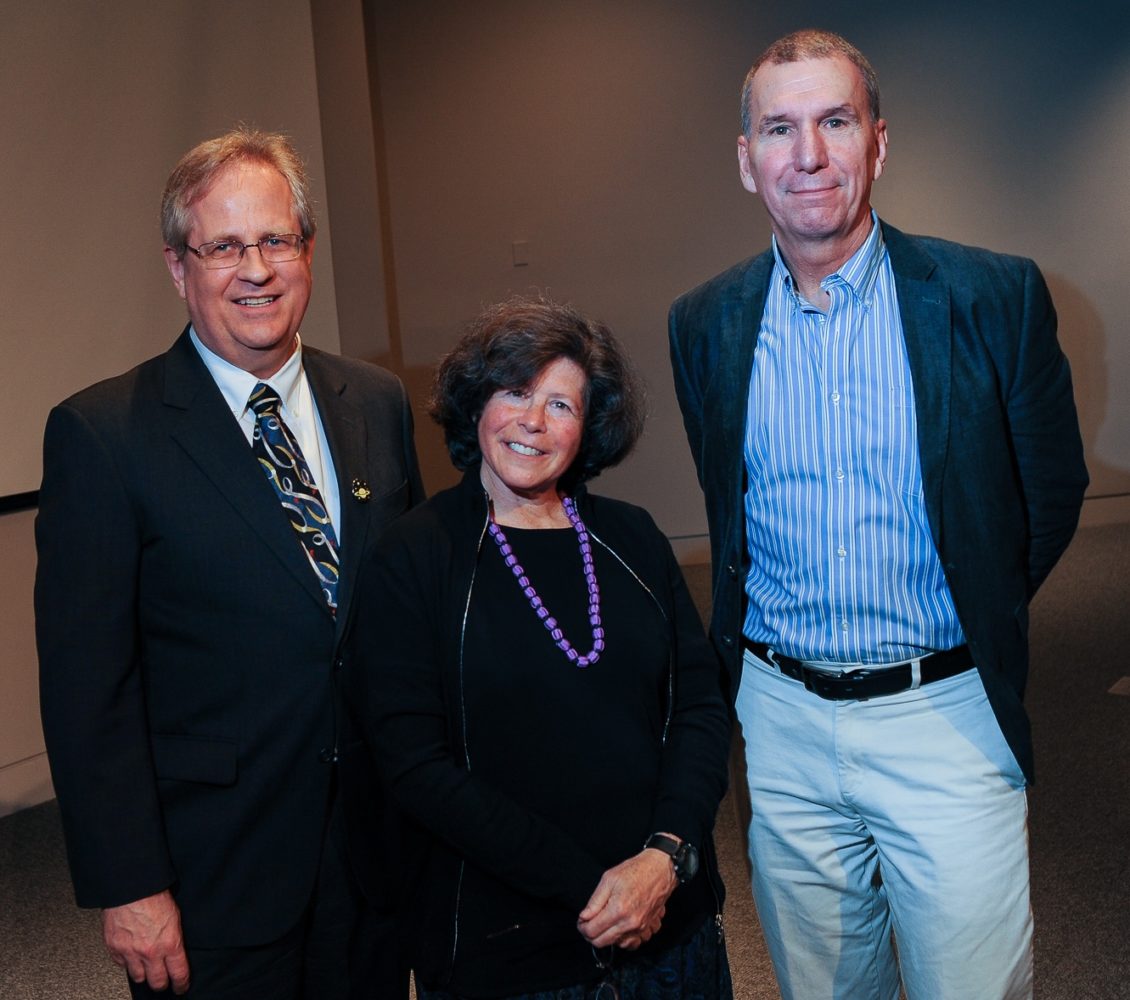
Health journalists John Fauber and Joanne Silberner share 2013 Victor Cohn prize for medical science reporting
Alan Boyle, Joanne Silberner, and John Fauber
Health journalists John Fauber, a medical investigative reporter for the Milwaukee Journal Sentinel, and Joanne Silberner, a freelance multimedia journalist and former National Public Radio correspondent, were presented the 2013 Victor Cohn Prize for Excellence in Medical Science Reporting.
Given the strong pool of entries, the judges elected to split the prize for the first time since the inaugural award in 2000. Silberner, now based in Seattle, was cited for her recent radio series on neglected diseases in developing countries, as well as her outstanding coverage of health policy at NPR. Fauber was cited for his relentless and exemplary investigative reporting on conflicts of interest in medicine and industry.
The Victor Cohn prize, for a body of work published or broadcast within the last five years, is administered by the Council for the Advancement of Science Writing, Inc. (CASW), a not-for-profit organization of journalists and scientists committed to improving the quality of science news and information reaching the public.
Fauber and Silberner shared the $3,000 award and received certificates at an awards ceremony held in Gainesville, FL on Saturday, November 2, during ScienceWriters2013, a joint meeting of CASW and the National Association of Science Writers (NASW). They are shown above at the event with CASW President and NBCNews.com Science Editor Alan Boyle.
Joanne Silberner

The Cohn Prize judges lauded Silberner, whose reporting career spans more than three decades, for “consistently breaking new ground in a heavily covered beat, and recognizing new angles in important stories rather than offering stories that everyone else covers.” Moreover, they said, “she then tells those stories with great humanity, with a keen understanding of public health policy implications and with verve.”
The judges were particularly impressed by Silberner’s enterprising December 2012 seven-part series on global cancer issues in Haiti, India and Uganda: “Her sparkling storytelling and the human dimensions in this series are hallmarks of Silberner’s sterling radio career,” they said. The radio series, broadcast on Public Radio International’s “The World,” was an independent multimedia project initiated by Silberner with travel support from the Pulitzer Center on Crisis Reporting.
Silberner’s work, the judges added, is “notable for its diversity, and eye (and ear) for the telling detail. In the series on cancer, for example, she catches the listener with the fact that more people in poor and developing countries die of cancer than of HIV/AIDS, tuberculosis and malaria combined. She also brought a personal emotional connection by comparing a Ugandan breast cancer patient’s experience with her own bout with the disease.” She has also reported on other public health issues, including mental illness, tropical diseases, chronic fatigue syndrome, H1N1 influenza, the Affordable Care Act, the Haiti earthquake medical disaster, vaccines and immunology, and drug and food safety regulation at the US Food and Drug Administration.
The prize committee unanimously and readily agreed with the assessment rendered by Wall Street Journal reporter Ron Winslow that her selection of topics “speak to her enterprise and to her determination to mine unexpected and neglected subjects and report to her readers and listeners well ahead of the pack.” Also writing in support of her nomination, Joe Palca of NPR said: “Joanne has that rare combination of the ability to see the big picture and at the same time sweat the details.”
Silberner began her career in medical writing in 1982 for Science News, went on to write for U.S. News & World Report, and then moved into radio at NPR in Washington, DC, where she covered medical research and health policy for 18 years. She has also been a leader in science writing as a founding member of both the DC Science Writers Association and the Association of Health Care Journalists. In addition to freelance work, she is an artist-in-residence at the University of Washington, where she also teaches journalism.
Silberner is a graduate of The Johns Hopkins University (BA in biology) and holds a master’s degree from the Columbia University Graduate School of Journalism. She also completed a yearlong fellowship at the Harvard School of Public Health.
Her work has been widely honored by numerous organizations, earning awards from the Society of Professional Journalists, American Heart Association, New York State Mental Health Association, March of Dimes and Easter Seals. Silberner was also a member of NPR teams that won the Dupont Silver Baton and the Peabody and National Academies Communication awards.
John Fauber
 Milwaukee Journal Sentinel reporter Fauber was cited for what the judges said was his “dogged, never-give-up” investigative series, dubbed “Side Effects,” on financial conflicts of interest in medical research and health care delivery. His stories also appear in MedPage Today, an online medical news web site, as part of a partnership between the two news organizations.
Milwaukee Journal Sentinel reporter Fauber was cited for what the judges said was his “dogged, never-give-up” investigative series, dubbed “Side Effects,” on financial conflicts of interest in medical research and health care delivery. His stories also appear in MedPage Today, an online medical news web site, as part of a partnership between the two news organizations.
The series, launched in 2009, looks at the pervasive marketing efforts of drug and medical device companies and how they affect patient care, doctor education, drug regulation and medical publishing. It offers rigorous scrutiny of drug companies’ use of financially conflicted doctors and flawed or over-hyped science to win FDA approval for drugs and devices that then come to market overpriced and overprescribed, the judges noted.
Fauber’s series told, for example, of guidelines issued for asthma treatment that were put together by physicians with financial ties to the maker of Advair, despite readily available evidence that the medicine could pose dangers and is vastly overprescribed. In another story, he revealed eyebrow-raising links between drug makers and disease advocacy groups, which promoted or paid for clinical trials, fueled the rapid growth of drug sales and returned portions of the drug company’s profits to the non-profit advocacy organization. Although Fauber made clear that some of the advocacy groups’ activities greatly advance the development of treatments for “orphan diseases,” his articles raise serious questions about conflicts of interest that may cloud clinical judgment and influence prescribing habits.
In other stories, Fauber exposed how a money-making spinal device won FDA approval even though FDA’s own advisory panel knew researchers with financial ties to the company got study results twice as good as those without such ties.
The judges were especially impressed by Fauber’s revelations that such conflicts are too rarely revealed to physicians or the public, and by his “willingness to pore over thousands of pages of documents, regulatory files and medical articles,” many obtained by open-records requests, in pursuit of his stories.
As the MIT Knight Science Journalism Tracker blog put it, “John Fauber apparently missed the memo on the death of print journalism and the dwindling opportunities for investigative reporting. He continues to go to work, chase documents, make calls and produce remarkable stories that any of us could have done, but didn’t.”
Fauber began his 35-year newspaper career as a reporter at the Milwaukee Sentinel, before leaving for a three-year stint as an investigative columnist for the weekly Business Journal. In 1988, he became a business reporter at the Milwaukee Journal and, in 1995, moved into health, medical and science reporting at the Milwaukee Journal Sentinel (a consolidation of both Milwaukee papers that is the largest newspaper in Wisconsin).
He covered heart disease, cancer and neurology until 2009, when his work focused on conflicts of interest in medicine. The “Side Effects” series already has won numerous awards, including the 2012 Loeb Prize for beat reporting, the 2010 National Headliner Award for medical/health/science writing, and the Barlett & Steele Silver Award for Investigative Business Journalism. He was a finalist for the Pulitzer Prize for Explanatory Journalism in 2003 for his work on chronic wasting disease. His other honors include the Howard L. Lewis Achievement Award presented by the American Heart Association, an earlier Loeb Prize, and three national journalism fellowships. Fauber has a bachelor’s in journalism from the University of Wisconsin-Milwaukee.
The Victor Cohn Prize
This year’s entries were judged by Ben Patrusky, CASW’s executive director emeritus; Joann Rodgers, a freelance writer and author, and faculty scholar at the Johns Hopkins Berman Institute of Bioethics; CASW immediate past president Cristine Russell, a freelance writer and senior fellow at Harvard’s Kennedy School of Government; and Carl Zimmer, an independent science and medical journalist.
This year marks the 14th presentation of the Victor Cohn Prize for Excellence in Medical Science Reporting. The inaugural award in 2000 was shared by Laurie Garrett of Newsday and Lawrence K. Altman of The New York Times. Subsequent recipients were Jon Palfreman, a public television documentarian; Shannon Brownlee, a noted magazine writer and book author; Michelle Trudeau of NPR; Rick Weiss of the Washington Post; Jerome Groopman of The New Yorker; Geeta Anand of The Wall Street Journal; Joe Palca of NPR; Denise Grady of The New York Times; Marilynn Marchionne of the Associated Press; Ron Winslow, of The Wall Street Journal; and Jon Cohen of Science Magazine.
The award honors the late Washington Post medical writer and health columnist Victor Cohn, who distinguished himself by the clarity and effectiveness of his reporting during a 50-year career. He was a co-founder in 1959 of CASW.
Read John Fauber’s (@fauber_mjs) work at the Milwaukee Journal Sentinel
Read Joanne Silberner’s (@jsilberner) work at The World and NPR